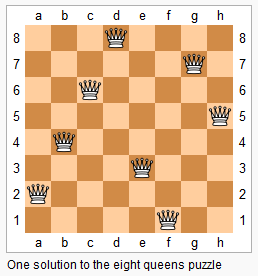The n-queens puzzle is the problem of placing n queens on an n×n chessboard such that no two queens attack each other.

Given an integer n, return all distinct solutions to the n-queens puzzle.
Each solution contains a distinct board configuration of the n-queens' placement, where'Q'and'.'both indicate a queen and an empty space respectively.
For example,
There exist two distinct solutions to the 4-queens puzzle:
[ [".Q..", // Solution 1 "...Q", "Q...", "..Q."], ["..Q.", // Solution 2 "Q...", "...Q", ".Q.."] ]
https://oj.leetcode.com/problems/n-queens/
思 路:经典的8皇后问题,还是老思路,生成perm数组,perm[i]的只代表第i行放置皇后的列数,递归下去的条件是不冲突(冲突的情 况:perm[j] == i || perm[j] - j == i - cur || perm[j] + j == i + cur),然后根据题目要求生成结果的形式即可。
import java.util.ArrayList;
public class Solution {
public ArrayList<String[]> solveNQueens(int n) {
if (n <= 0)
return null;
ArrayList<String[]> res = new ArrayList<String[]>();
int[] perm = new int[n];
slove(perm, 0, n, res);
return res;
}
private void slove(int[] perm, int cur, int n, ArrayList<String[]> res) {
if (cur == n) {
String[] tmp = new String[n];
for (int i = 0; i < n; i++) {
char[] item = new char[n];
for (int j = 0; j < n; j++)
item[j] = '.';
item[perm[i]] = 'Q';
tmp[i] = new String(item);
}
// System.out.println(Arrays.toString(tmp));
res.add(tmp);
} else {
int i;
for (i = 0; i < n; i++) {
int j;
boolean ok = true;
for (j = 0; j < cur; j++) {
if (perm[j] == i || perm[j] - j == i - cur
|| perm[j] + j == i + cur)
ok = false;
}
if (ok) {
perm[cur] = i;
slove(perm, cur + 1, n, res);
}
}
}
}
public static void main(String[] args) {
System.out.println(new Solution().solveNQueens(4));
}
}
第三遍记录:
import java.util.ArrayList; public class Solution { public ArrayList<String[]> solveNQueens(int n) { if (n <= 0) return null; ArrayList<String[]> res = new ArrayList<String[]>(); int[] perm = new int[n]; solve(perm, 0, n, res); return res; } private void solve(int[]perm,int cur,int n,ArrayList<String[]> res){ if(cur==n){ String[] tmp = generateRes(perm); res.add(tmp); return; } for(int i=0;i<n;i++){ boolean ok =true; // check the conflict with perm[cur]=i // j perm[j], cur i for(int j=0;j<cur;j++){ if(perm[j]==i||perm[j]-j==i-cur||perm[j]+j==i+cur){ ok=false; break; } } if(ok){ perm[cur]=i; solve(perm,cur+1,n,res); } } } private String[] generateRes(int[] perm){ String[] res = new String[perm.length]; for(int i=0;i<res.length;i++){ StringBuilder sb = new StringBuilder(); for(int j=0;j<res.length;j++){ if(perm[i]==j) sb.append("Q"); else sb.append("."); } res[i] = sb.toString(); } return res; } }